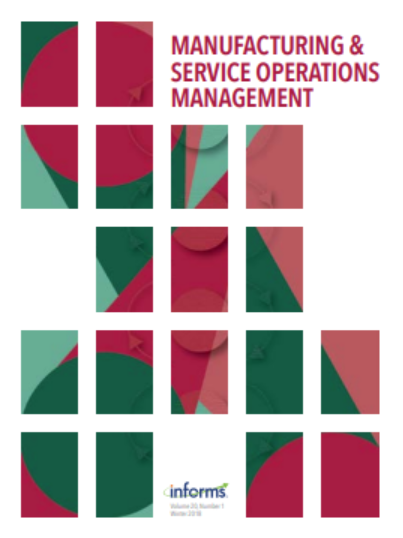Effect of Guided Delegation and Information Proximity on Multitier Responsible Sourcing
IF 4.8
3区 管理学
Q1 MANAGEMENT
M&som-Manufacturing & Service Operations Management
Pub Date : 2023-09-19
DOI:10.1287/msom.2020.0446
引用次数: 0
Abstract
Problem definition: Guided delegation, a practice in which companies provide guidelines when delegating supplier management to tier 1 firms, is a common practice in managing complex supply chains. We study the benefits and risks of this approach in a three-tier supply chain setting consisting of a buying firm, a tier 1 contract manufacturer, and tier 2 suppliers, where responsibility risk stems from the tier 2 suppliers. We analyze the buyer’s profit and the supply chain’s responsibility risk under a guided-delegation model, in which the buyer specifies an authorized tier 2 supplier for the tier 1 manufacturer as a guideline and may audit the tier 1 firm for compliance. We compare this model with a full-delegation model, in which the buyer fully delegates tier 2 supplier selection to the tier 1 firm. Methodology/results: We formulate a Stackelberg game for the buyer’s contract design problem. We show that guided delegation does not always yield its expected results of lower supply chain risk and greater buyer profit. In instances where compliance auditing is financially more attractive to the buyer than paying a premium for tier 1’s responsible sourcing, guided delegation can result in higher profit but increased risk because compliance auditing cannot completely eliminate the risk. Additionally, when tier 1 anticipates buyer audits and demands higher wholesale prices to offset potential penalties, guided delegation may lead to decreased risk but lower profit for the buyer. Our analysis shows that delegating audit responsibilities to tier 1 often does not improve the buyer’s profit, and in situations where it does, it invariably raises the supply chain risk. Managerial implications: Our research identifies the potential downsides of guided delegation, offering insight for external stakeholders on where to focus efforts to avoid these pitfalls. It suggests that the intended benefits of guided delegation can only be realized when paired with compliance auditing. Supplemental Material: The online appendix is available at https://doi.org/10.1287/msom.2020.0446 .指导性委托与信息接近对多层负责任采购的影响
问题定义:指导性委托,即公司在将供应商管理委托给一级公司时提供指导方针的做法,是管理复杂供应链的常见做法。我们在一个由采购公司、一级合同制造商和二级供应商组成的三级供应链环境中研究了这种方法的收益和风险,其中责任风险源于二级供应商。我们在指导-委托模型下分析了买方的利润和供应链的责任风险,在该模型中,买方为一级制造商指定授权的二级供应商作为指导,并可能审核一级公司的合规性。我们将此模型与完全委托模型进行比较,在完全委托模型中,买方将二级供应商的选择完全委托给一级公司。方法/结果:我们为买方合同设计问题制定了一个Stackelberg博弈。我们发现,指导性授权并不总是产生预期的低供应链风险和高买方利润的结果。在合规性审计在财务上比为第一级负责任的采购支付溢价对买方更具吸引力的情况下,有指导的委托可能会带来更高的利润,但也会增加风险,因为合规性审计不能完全消除风险。此外,当一级采购商预计买家会进行审计,并要求更高的批发价格来抵消潜在的罚款时,引导授权可能会降低风险,但降低买家的利润。我们的分析表明,将审计责任委托给一级审计机构通常不会提高买方的利润,而且在这种情况下,它总是会增加供应链风险。管理启示:我们的研究确定了指导性授权的潜在缺点,为外部利益相关者提供了关于在何处集中努力以避免这些陷阱的见解。它表明,只有与遵从性审计配合使用时,才能实现指导性委托的预期好处。补充材料:在线附录可在https://doi.org/10.1287/msom.2020.0446上获得。
本文章由计算机程序翻译,如有差异,请以英文原文为准。
求助全文
约1分钟内获得全文
求助全文
来源期刊

M&som-Manufacturing & Service Operations Management
管理科学-运筹学与管理科学
CiteScore
9.30
自引率
12.70%
发文量
184
审稿时长
12 months
期刊介绍:
M&SOM is the INFORMS journal for operations management. The purpose of the journal is to publish high-impact manuscripts that report relevant research on important problems in operations management (OM). The field of OM is the study of the innovative or traditional processes for the design, procurement, production, delivery, and recovery of goods and services. OM research entails the control, planning, design, and improvement of these processes. This research can be prescriptive, descriptive, or predictive; however, the intent of the research is ultimately to develop some form of enduring knowledge that can lead to more efficient or effective processes for the creation and delivery of goods and services.
M&SOM encourages a variety of methodological approaches to OM research; papers may be theoretical or empirical, analytical or computational, and may be based on a range of established research disciplines. M&SOM encourages contributions in OM across the full spectrum of decision making: strategic, tactical, and operational. Furthermore, the journal supports research that examines pertinent issues at the interfaces between OM and other functional areas.
 求助内容:
求助内容: 应助结果提醒方式:
应助结果提醒方式:


